My Strange Loop 2013: Part 1
I have been excited about StrangeLoop for a while, I actually told somebody the two tech conferences I've always wanted to attend were Emerging Languages Camp and StrangeLoop. When I found out that ELC was merged into the StrangeLoop pre-conference; I started watching the @strangeloop_stl twitter account like a hawk for when they opened registrations. So you can guess that I had high expectations.
Inspired by Sean Corfield I'm providing a summary of the sessions I attended and my takeaways along with some general commentary about the conference.
Emerging Languages Camp
Gershwin: Stack-Based Concatenative Clojure
Daniel came up with novel way to make a stack-based language exist inside the Clojure world with only minuscule hacking of the Clojure reader. The syntax is inspired by Factor. Daniel suggests using it when you are excessively using the threading macros in Clojure. I can see why you might do it, but is the minor continence provided by Gershwin worth adding another language to your stack?
Daimio
A stack-based language designed for sharing*. Where sharing in this context means letting users extend functionality of your web-apps and share those extension with other users. The focus being on there being clearly defined boundaries between your JavaScript and the code written by users in Daimio. You can see a cool multiplayer turtle demo here.
Babel: An Untyped Stack-based HLL
Babel was introduced as a language created as a response to not being able to trust software that you're using from the NSA/goverment/Facebook but it doesn't seem to give you anything that any other language does apart from having arbitrary-precision arithmetic and crypto in the standard library. It's stack based and kind of inspired by Forth and Perl(???). It seems like something that would be fun to write an rpython interpreter for though. There was some novel stuff about containerising the runtimes and being able to run nested programs but I didn't really understand much of that.
Noether
Noether is weird; but in a good way. It's a language that resembles an onion.
The inner layers are highly constrained in what you can do but provide strong
guarantees on correctness. As you move to the other layers,
you're allowed to be more expressive (e.g. dynamic types) but you lose some of
the guarantees. The slides were quite theory heavy, I would have loved to seen
a demo of the language but maybe that doesn't exist yet. I'll be keeping an eye
on this one.
Workshops
I booked myself in for Kipp Bradford's hardware hacking for the rest of us workshop. I've messed with RaspberryPi before but never done any real embedded development so I wanted to see how to get started. His session was great, even for someone like me who hadn't purchased the harware kit that went along with this workshop. Kipp showed us how to get a zigbee wireless network working between a full of arduinos. Along with all the basics on how to get started, what to order, how to set up the Arduino IDE. I thought it was well worth it.
Unsessions
In the evening there was a track of unsessions, most of which I missed because I
was grabbing a leisurely dinner. I did make it back in time for Jason Wolfe's
unsession
about a new library for validating data schemas in a declarative style for
Clojure. What I found interesting about this is the goal wasn't to add enforced
shape validation but rather a formalised documentation technique which could be
optionally enforced when running tests without affecting runtime. I feel like
I'm much more likely to use this than clojure.core.typed.
Thursday
Machine Learning for Relevance and Serendipity — Jenny Finkel
Jenny talked about how Prismatic are using machine learning to deliver better article recommendations. Prismatic is an RSS reader on auto-pilot. Instead of users manually maintaining the feeds they want to subscribe to, Prismatic slurps in links shared by people you follow on social networks and also some preset topics you mark as interesting. From there the Prismatic hive mind watches how you interact with the articles they present to you and improve suggestions using standard machine learning techniques.
Jenny tells us there is no secret sauce. Which got @PLT_HULK rather excited:
NEXT PERSON WHAT USE "SECRET SAUCE" TO DESCRIBE THEM LANGUAGE OR FRAMESWORK HULK WILL SQUIRT SRIRACHA IN THEY EYES!!
— PLT HULK (@PLT_Hulk) September 19, 2013
She went into some of the problems they've faced with training their model including something called the Daily Mail problem. In an earlier iteration of Prismatic if you read an article from the Daily Mail Online then your feed would get flooded by more Daily Mail crap. This is due to the pool of articles Prismatic thinks you'll like is much larger than the number of articles you see. So if you view a Daily Mail article then all other Daily Mail articles in the pool recieve a small boost but enough so they they dominate what you'll actually be presented with.
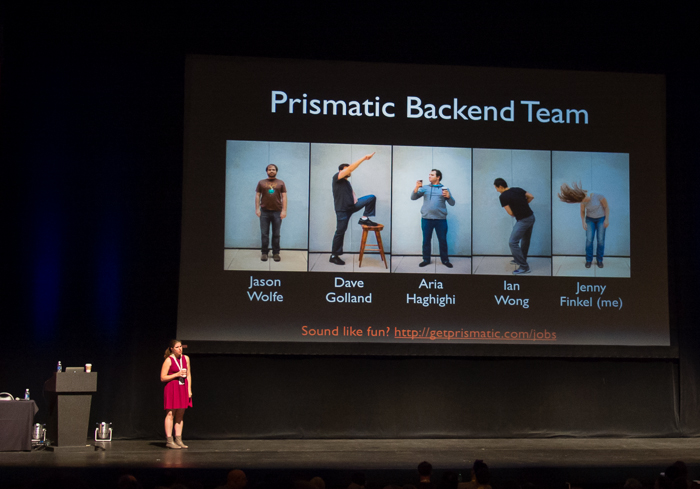
zip Code: Unpacking Data — Scott Vokes
Scott did a great talk on how the compression algorithms we take for granted every day work and the research behind them (e.g. gzip, zlib, bzip2). The great thing about this talk was how he went through what sort of data compresses best with each type of compression algorithm.
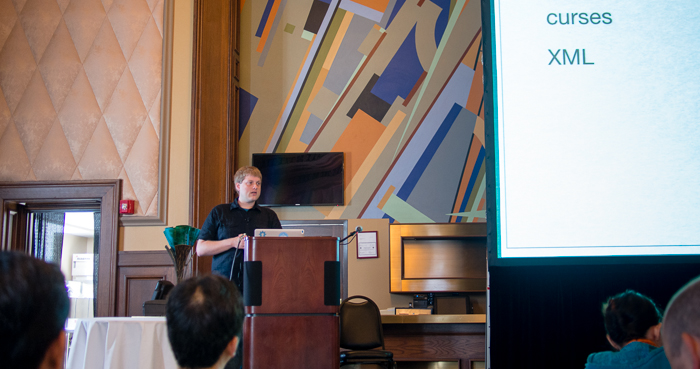
He followed up with how he wrote a compression algorithm that worked in the limited memory environments of embedded computers.
Erlang for Authoritative DNS — Anthony Eden
Anthony talked us through the challenges and misteps his company took when rolling out their next generation of anycast DNS services.
They began with a powerdns setup with a Ruby/SQL backend for responding to DNS queries that required dynamic data in their response and as you can guess it didn't scale. Sure they could have thrown a million boxes at it but that doesn't really make sense as DNS is an amazingly thin margin business.
So he decided to rewrite the ruby part in a number of languages from Python (not much quicker than Ruby), Clojure (JVM startup time and IPC) to Go (not mature/stable enough at the time). None of these provided the performance or reliability he was looking for, instead he dumped PowerDNS completely and wrote his own Erlang DNS server (open-sourced it too).
The reasons he likes Erlang/OTP for this is that it's been doing pretty similar roles at massive scale in the telco industry for decades now. The pattern-matching allow you to destructre a DNS query packet with minimal lines of code. It's fast. It behaves nicely with kv-store caches like Memcached. However they were using JSON as their serialization format and it sucks for parsing JSON (easily solved by using a C-extension).
The other cool hack they did was instead of writing their own test suite (DNS is hairy and has lots of edge cases), the reused PowerDNS' test suite and have been contributing tests back upstream.
Rails Girls: Empowering women through code — Adriana Palacio and Laura Garcia
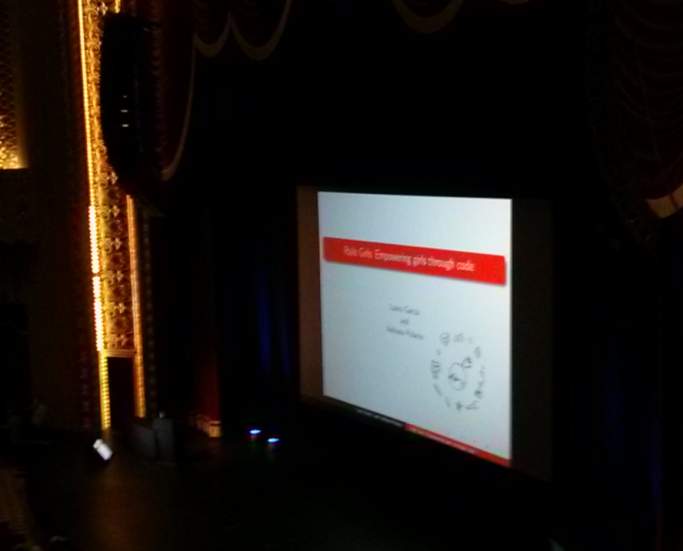
Adriana and Laura are both Computer Science students from Columbia and were selected to talk about their summer of code project as part of the RailsGirls conference outreach program to attend StrangeLoop.
If you don't already know, RailsGirls is an organisation where girls can come along to a venue and be mentored and helped with it comes to learning Rails. It's less of a classroom and more of "hey I've been trying to get this tutorial to work but I keep getting this error" and the mentors can help fix it and stop people getting frustrated.
They also have a Google style summer of code program where an open source project can get someone from the RailsGirls community to work on their code base in exchange for management, mentoring and guidance.
This is cool for many reasons as it addresses all of the following:
- Not many women work in programming
- Of those few, even fewer are involved in open source projects
- Of those few, even fewer give talks at tech conferences
Bonus points: Only presentation done in Beamer/LaTeX of the conference.
Functional Reactive Programming in Elm — Evan Czaplicki
Evan live coding a Mario clone to show off some of the features in Elm. One of the coolest things was foldp or fold past
which does a fold not in terms of foldl or foldr on a sequence
but in terms of time (apply this fn to the state of this value at
every tick in the game and use it as input when the next tick
happens).
The interesting trade off Elm makes to enable foldp to work is that
it enforces a global ordering of events. I wonder what the performance
impact of this is. I question if FRP can even work for games
programming given the hacks you can do with mutable state for
performance gains.
You can watch it on infoq.
Clojure core.async — Rich Hickey
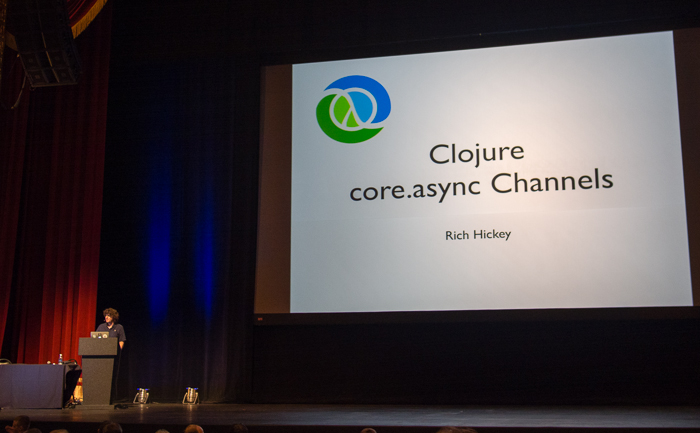 Another tour-de-force from Rich, this talk wasn't exactly on
Another tour-de-force from Rich, this talk wasn't exactly on
core.async but on the wider problem of concurrent programming and
why we are able to reason about the pitfalls of concurrent programming
when we write code that needs to travel across network boundaries but
we throw all caution to the wind when working locally. His solution to
this is to use a lightweight and simple tool to provide higher level
primatives that abstract this distinction away both when working
locally and over the network.
Linear Logic Programming — Chris Martens
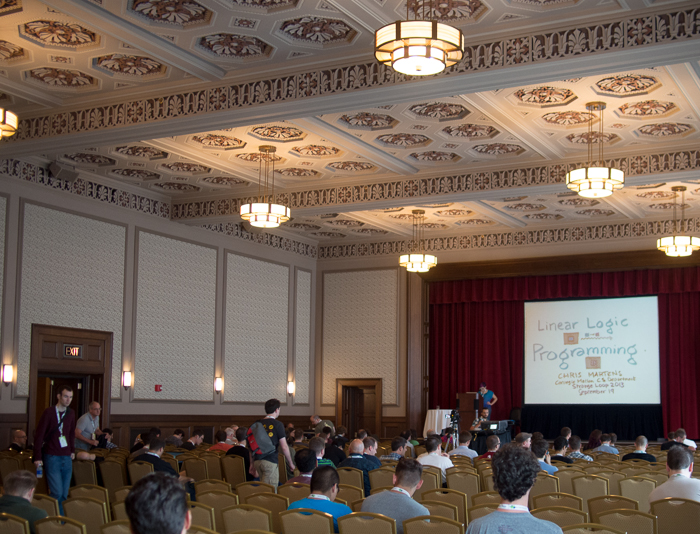
Most people here would be familiar with Prolog or Clojure's
core.logic which both rely on
first-order
logic. Chris talks about what happens when you swap out first-order
logic for linear logic and what makes possible.
I was blown away by the possibilities for using linear logic programming for generating stories/literature. I've kind of gone down the rabbit hole on this topic so expect some experiments with it soon.
Part two will be published shortly. There's just too much to cram into this post.